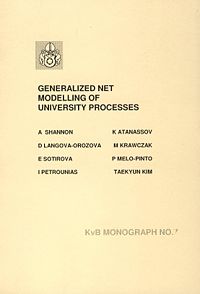Please check our Instructions to Authors and send your manuscripts to nifs.journal@gmail.com.
Deadline for submissions: 10 May 2026.
Generalized Net Modelling of University Processes

"Generalized Net Modelling of University Processes" is a book by Anthony Shannon, Krassimir Atanassov, Daniela Langova-Orozova, Maciej Krawczak, Evdokia Sotirova, Pedro Melo-Pinto, Ilias Petrounias, Taekyun Kim published in 2005 year by KvB Institute of Technology under ISBN 0-9578457-5-8.
The purpose of the book is to show how generalized nets can be used to model the administrative and academic functions of electronic information processing and exchanges within a university.
While software exists for the processes in each section of the monograph, it is difficult to integrate them all, particularly when new applications are added piece by piece. This total integration can be achieved with GN models as the theoretical basis for development. Then the academic needs of staff and students can be linked appropriately with the administrative requirements of a modern university.
The chapters of the books are divided into sections, all but one of which are composed of three subsections:
- an introduction which outlines the purpose of the section,
- followed by a sub-section in which the pertinent generalized net is constructed, and
- a conclusion which comments on the main aspects of the model.
| ↓ | ↑ | ||||||
| Administration stream |
→ | 1.2 | Appendices A.B | ||||
| ↓ | |||||||
| 1.3 | 4.4 | ||||||
| ↓ | ↑ | ||||||
| 1.5 | → | 4.1 | |||||
| ↓ | ↓ | ||||||
| 2.3 | 4.2 | ||||||
| ↑ | ↓ | ↓ | |||||
| 1.1 | → | 3.1 | → | 4.3 | ↑ | ||
| ↓ | ↑ | ↑ | |||||
| Academic stream |
2.4 | 3.3 | |||||
| ↑ | ↑ | Appendix C | |||||
| 2.2 | 3.2 | ||||||
| ↑ | ↑ | ||||||
| 2.1 | → | 2.5 | |||||
| ↑ | |||||||
| 1.4 | |||||||
| ↑ | ↓ | ||||||
The first GN constructed for this purpose aims to optimize the information processes in general. This leads into two streams:
- Administration
- Finance
- Logistics
- Storage and supply of goods and services
- Storage and retrieval of information
- Academic
- Electronic learning and training
- Assessment
- Internet forum
- Electronic mail
There are also two appendices which provide outline summaries of:
- Generalized nets
- Intuitionistic fuzzy logic
Table of contents
- List of figures — page iv
- List of tables — page vi
- Preface — page vii
- Flowchart of main ideas — page x
- Chapter 1: GN models of basic processes — page 1
- 1.1 Information processes
- 1.2 Financial modelling
- 1.3 Supply and service
- 1.4 Timetabling
- 1.5 Electronic archives
- Chapter 2: GN models of e-learning systems — page 59
- 2.1 Electronic learning
- 2.2 Electronic assessment
- 2.3 Electronic library
- 2.4 Intelligent training systems
- 2.5 Electronic learning assessment
- Chapter 3: GN models and the Internet — page 120
- 3.1 Internet forum
- 3.2 How the forum works
- 3.3 Multi-user chats
- Chapter 4: GN models of the Intranet — page 159
- 4.1 University Intranet
- 4.2 Information flow in the Intranet
- 4.3 Electronic mail status
- 4.4 A training system
- Appendix A: Generalized nets (GNs) — page 199
- Appendix B: Intuitionistic fuzzy logic — page 220
- Appendix C: Academic career positions — page 223
- Concluding remarks — page 252
- Bibliography — page 254